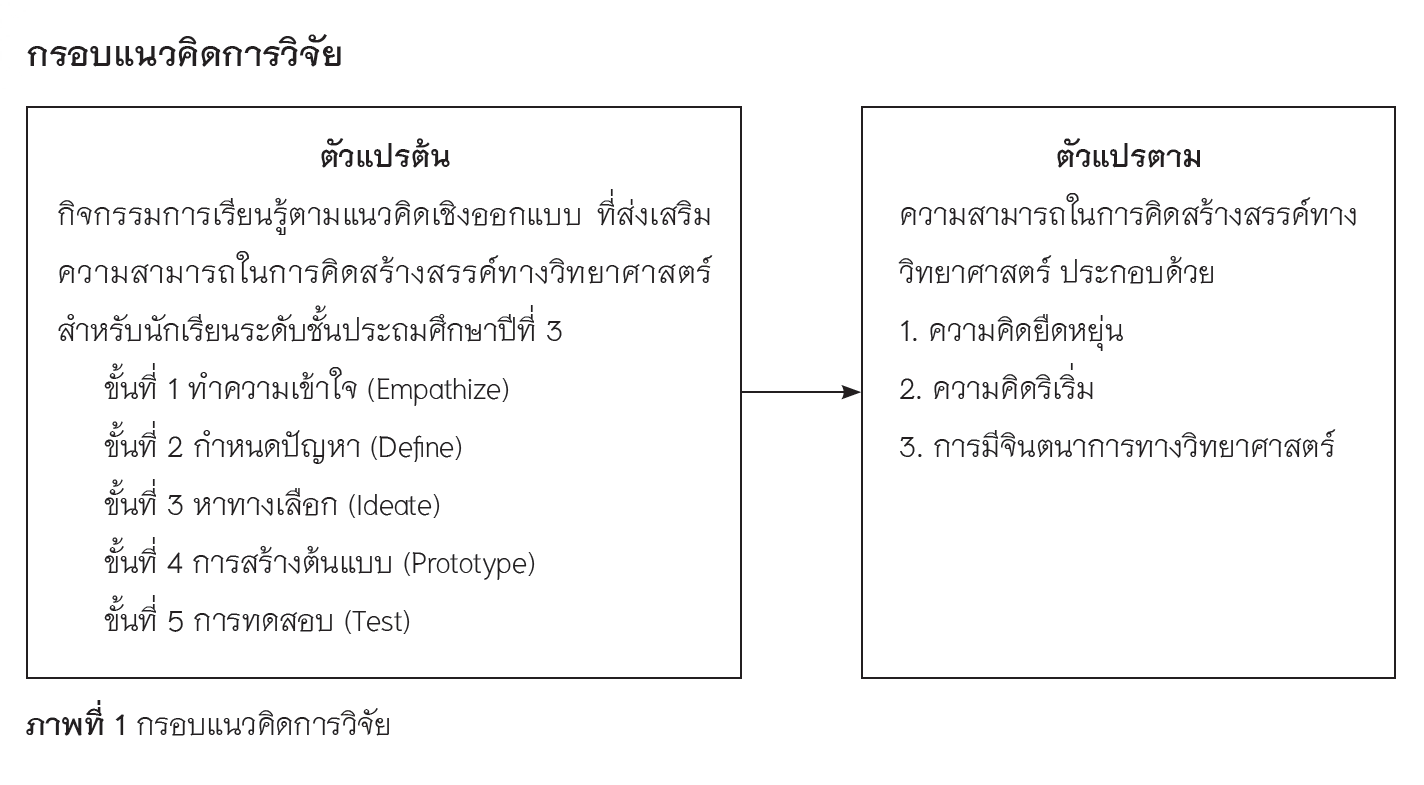The Development of Learning Activities Based on The Design Thinking Approach to Enhance Scientific Creativity for Grade 3 Students
Main Article Content
Abstract
The purposes of this research were 1) to construct and evaluate the effectiveness of learning activities based on design thinking approach to enhance scientific creativity according to the 75/75 criteria, 2) to implement the use of learning activities based on design thinking approach to enhance scientific creativity. The research was carried out by research and development process. The sample consisted of 21 students in grade 3, second semester, academic year 2022, from Ban Samlang Pracharangsan School, Sukhothai Province, which were obtained by simple random sampling. The research instruments were learning activities based on design thinking approach, lesson plans based on design thinking approach, scientific creativity assessment form. The statistics used in data analysis were mean, standard deviation, percentage and t-test. The results were founded that;1. Learning activities based on design thinking approach to enhance scientific creativity for students in grade 3 developed, of 5 steps: 1) empathize, 2) define, 3) ideate, 4) prototype and 5) test. The results of appropriateness of learning activities were at a high level ( = 4.27 S.D. = 0.31) and the efficiency was 77.22/76.67, which was in accordance with the specified criteria. of 75 percent with a statistical significance at the .05 level.
Downloads
Article Details

This work is licensed under a Creative Commons Attribution-NonCommercial-NoDerivatives 4.0 International License.
References
Buason, R. (2012). Leadership in educational innovation. (2nd ed.). Phitsanulok: Bump Creerick. [In Thai]
Guilford, J.P. (1967). The nture of human intelligence. New York: McGraw-Hill Book Co.
Hu, W., & Adey, P. (2002). A scientific creativity test for secondary school student. International Journal of Science Education, 24(4), 389-403.
Jantakoon, J. (2021). Final report of the educational quality development and development project. Phitsanulok: Naresuan University. Research Councilnational. [In Thai]
Jui, C. (2018). Study on the learning effectiveness of Stanford design thinking in integrated design education: Graduate School of Design. International Journal of Science Education,38(2), 23–44.
Ministry of Education. (2017). Basic education core curriculum, B.E. 2551, revised edition 2017. Bangkok: Agricultural Cooperative Federation of Thailand. [In Thai]
PhanitPhalinchai, T. (2014). Statistics for research. Phitsanulok: Naresuan University. [In Thai]
Phoonkhetkid, S. (2020). The deveropment of learning actives by using design thinking approach to enhance creativity and innovation skill for Mathhayomsuksa 6 students. (Master’s thesis, Naresuan University). [In Thai]
Panasuphon, P. (2013). Education reform in the second decade. Academic Journal, 5(3), 2-14. [In Thai]
Sritha, S. (2018). The development of twelfth grade students scientific creativity using learning management based on constructionism approach on the nervous system. (Master’s thesis, Kasetsart University). [In Thai]
Saenna, W. (2022). The development of science creativity thinking test for high school students of northeastern Princess Chulabhorn Science High Schools. (Master’s thesis, Mahasarakham University). [In Thai]
Stanford Design School. (2005). Bootcamp bootleg. Retrieved from https://dschool.stanford.edu/fellows-in-residence/project-fellowship-historyapproach
The Standford D. School Bootcamp Bootleg. (2010). Bootcamp Bootleg. Retrieved from http://dschool. stanford.edu/wp-content/uploads/2011/03/BootcampBootleg2010v2SLIM.pdf
The Stanford D. School Bootcamp Bootleg. (2019). Design thinking bootcamp bootleg. Retrieved from https://dschool.stanford.edu/resources/the-bootcampbootleg
Thongjun, N. and Pankaew, P. (2016). Development of creative thinking in science of lower secondary students learning through brain storming. (Master’s thesis, Chiang Mai University). [In Thai]


